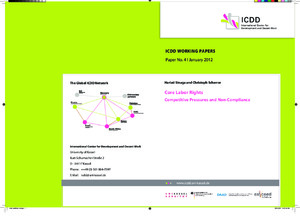| dcterms.abstract | The working paper’s main objective is to explore the extent to which non-compliance to international labor rights is caused by global competition. From the perspective of institutional economics, compliance with core labor rights is beneficial for sustainable development. Nonetheless, violations of these rights occur on a massive scale. The violators usually blame competitive pressures. A number of studies have come to the conclusion that non-compliance does not provide for a competitive edge, thereby denying any economic rationale for non-compliance. While we sympathize with this conclusion, we find that these studies suffer from faulty assumptions in the design of their regression analyses. The assumption of perfect markets devoid of power relations is particularly unrealistic. While workers' rights promise long-term benefits, they may incur short-term production cost increases. On the supply side, the production sites with the highest amount of labor rights violations are characterized by a near perfect competitive situation. The demand side, however, is dominated by an oligopoly of brand name companies and large retailers. Facing a large pool of suppliers, these companies enjoy more bargaining power. Developing countries, the hosts to most of these suppliers, are therefore limited in their ability to raise labor standards on their own. This competitive situation, however, is the very reason why labor rights have to be negotiated internationally. Our exploration starts with an outline of the institutionalist argument of the benefits of core labor rights. Second, we briefly examine some cross-country empirical studies on the impact of trade liberalization (as a proxy for competitive pressures). Third, we develop our own argument which differentiates the impact of trade liberalization along the axes of labor- and capital-intensive production as well as low and medium
skill production. Finally, we present evidence from a study on the impact of trade liberalization in Indonesia on the garment industry as an example of a low skill, laborintensive industry on the one hand, and the automobile as an example for a medium skill, capital-intensive industry on the other hand. Because the garment industry’s workforce consists mainly of women, we also discuss the gender dimension of trade liberalization. | eng |

